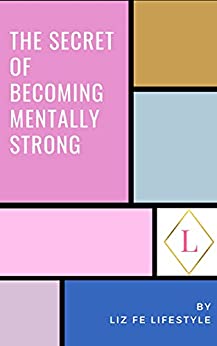
We know that mental health is such an important topic to talk about. Amy Morin is a psychotherapist, mental strength trainer, and international bestselling author. With over 14 million views, her TED Talk “The Secret of Becoming Mentally Strong” is one of the most popular talks of all time. Additionally, Amy Morin has dedicated her career to studying the habits of mentally strong people.
“So I have a Facebook friend who’s life seems perfect….How many of you have a friend kind of like that and how many of you don’t like that person sometimes?”
Amy Morin, “The Secret of Becoming Mentally Strong,” TEDxOcala (2015).
The auditorium responds to this question with laughter, as this is one of the first things Amy Morin says in her inspirational speech. However, the widespread laughter stopped as Morin began to express how this way of thinking costs us our mental strength.
Amy Morin goes on to explain the traps our minds set for us to eventually fall into bad habits. Moreover, she discusses the three most common unhealthy habits we happen to fall into, the ways we can change our actions, and ultimately–how to begin this process.
Eventually, Morin goes into detail on the unhealthy habits and beliefs that keep us from being mentally strong and moreover, shares her own story. In doing so, Morin stresses that you need to be prepared to give up bad beliefs because you cannot afford not to.
“There comes a time when we need all the mental strength you can muster.”
Amy Morin, 2015.
If you are interested in reading more about this incredible TED Talk and Amy Morin’s advice, keep reading:
Amy Morin: Her Story
At the young age of 23, Morin had just graduated from graduate school. Amy was just starting her career, getting married, and even moving into a new home. However, Morin was devastated to learn of her mother’s passing from a brain aneurysm. Amy expressed how she pitied herself for years, and, like most of us would–she wondered why she had to lose her mother so soon. She assumed that her mother would be around for many more years to come.
Amy Morin gave herself time to grieve for her mother, and after some time, Morin felt like the feeling in the pit of her stomach was starting to lessen. On the three-year anniversary of her mother’s death, Amy and her husband Lincoln were invited to attend a basketball game. Consequently, the event was held at the very same place Morin had last seen her mother prior to her death. However, Amy and Lincoln still decided to go.
Afterward, Lincoln was admitted into the hospital. Amy’s husband ultimately passed away from a heart attack. Once again, Morin fell into grief over another shocking, unthinkable loss.
The self-pity was all consuming and Amy found herself wondering, “I’m a 26-year-old widow without a mom…What I am I to do?”
Still, Amy Morin took the necessary steps to try and avoid falling into a bad mindset. Four years later, Amy had met her new husband, Steve. As she settled into her life, she grew close to her new father-in-law. In yet another tragedy, her father figure was diagnosed with inoperable cancer, and Amy once again lost someone she loved.
“Why is this happening to me again?”
Somehow, Morin challenged herself to identify all the unhealthy habits she would avoid during her grief. Eventually, Amy came to the conclusion that building mental strength required understanding destructive beliefs.
Destructive Beliefs
In her infamous TED Talk, Morin explains that bad habits, thoughts, and beliefs are costing you more than you realize. She takes us back to her introduction, where we laughed over disliking a Facebook friend who seems to have a ‘perfect life. Researchers have found that envying your friends on Facebook can lead to depression. In fact, even feeling envious for 5 seconds is taking away too much time from focusing on yourself.
Morin divides these destructive beliefs into three categories. This way of thinking, Amy believes, robs you of much-needed mental strength.
Unhealthy Beliefs About Ourselves
The first of these destructive beliefs stem from being uncomfortable with feelings. In these cases, you find yourself feeling sorry for yourself. While it is normal to feel sad, you are only magnifying that misfortune by saying things like: “Why do things like this always happen to me?”
Lying in this self-pity is only a temporary distraction from the pain. These thoughts about ourselves keep us stuck in a bad mindset, and you are only focusing on the problem. That is, you are not thinking about ways to heal. The solution is to go through the pain, allow yourself to feel those emotions fully, and then you can begin to move on.
Unhealthy Beliefs About Others
Another bad habit is thinking that other people control us, and, as a result, we give them our power. These sorts of destructive beliefs come out when we say things like: “My mother-in-law is such a pain.” The truth is, we live in a free world, and there are very few things that we have to do.
In other words, you are always in control of how you react to others around you. Letting your mother-in-law or even your boss affect you or your mood is your choice; holding onto that reaction only means holding yourself back. The best solution is to only compare yourself to the person you were yesterday–never anyone else.
Unhealthy Beliefs About The World
The final destructive belief stems from this general idea that the world is a fair place. In reality, good actions aren’t always rewarded. For another example, people often say “hard work guarantees success.” Maybe this is true for some people, but it is just not the way the world works. The world is what you make of it, but you have to change your own thoughts first. Start to accept things around you (even the negative things) so you can prepare for disappointment and how to move on.
“Mental strength is like physical strength; you have to cut out the junk food.”
In other words, you have to give up the bad habits and start exercising the good ones. Train your brain to give up bad mental habits. For example, you can trade out resenting someone’s success with practicing gratitude for all the good things you have in your life.
One Small Step
If there is anything to take away from Amy Morin’s speech, it’s that one change can make a big difference. In fact, sometimes taking the first step is just what you need. Training your mind is a domino effect; once you have a solid, positive perspective–so many of your actions will change.
Amy Morin illustrates this concept by speaking about her encounter with a man who has diabetes. Morin tells the audience how this man’s diabetes was genetic, and it was passed down from his mother. As a result, the man believes his life is doomed, and he decides not to make any changes to his diet or exercise. Eventually, the man loses his vision license without making these changes.
While he knew he could do something to change his situation, he didn’t think making the changes would be worth it. In the end, Morin shares, the man decides to swap regular soda for diet soda and his numbers changed drastically. After this, the man decided to make goals to get his vision back; and he had a specific goal in mind to reach it. It is easy to see how one small step can change your mindset, and how a changed mindset can affect your life.
At the end of the day, we all struggle with our mental health–or at least one of these destructive habits Morin speaks on. Morin ends this TED Talk by asking us to consider what bad mental habits or destructive beliefs are holding us back. Moreover, what is one small step you could take right here and right now to take control back? All of us have something we can work on, and, as we’ve seen–it really only takes one small step to get you started. So, what are you waiting for? It is time to take back control of your mental health, your thoughts, and ultimately–the way you live your life.



